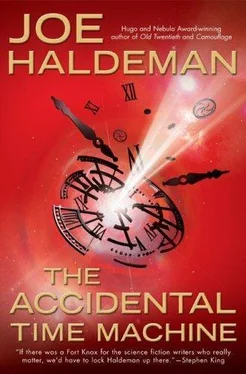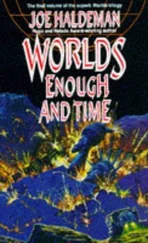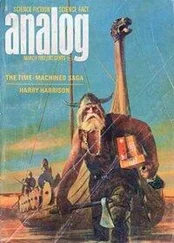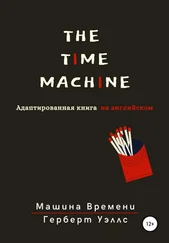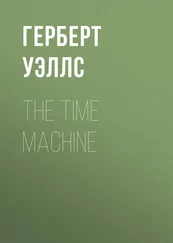“They call me La,” she said. “Ell Ay.” Doors had opened in the craft, resembling the wings of a coasting seabird. La slipped into a swivel chair in the front.
Martha stepped into the craft and perched uneasily on the luxurious high-backed leather couch. Matt got onto the couch next to her and fastened a seat belt. “Where are we going?” Martha asked.
“To my palace. Fasten your belt.” Matt reached over and helped her with the mechanism. “You’ll be more comfortable there than with these people, I think. I’m equally comfortable everywhere, of course.”
“Not being flesh,” Matt said.
“No. I’m centuries away from needing that.”
“But those people”—he inclined his head toward the house—“they’re not projections. They’re regular people?”
“Very regular. Very typical.” As the doors eased shut, the ship became transparent. “I don’t suppose you’ve ever flown, Martha?”
“No,” she said with a rising inflection, looking all around. At least the floor was opaque.
“It’s safer than walking. But it might take you a few minutes to get used to it.”
The ship rose like a fast elevator, the ground dropping away, roofs shrinking. Martha clutched for Matt and buried her face in his chest.
Arms full of soft girl for the first time in a long time, Matt patted her back reassuringly. “It’s all right. It’s very ordinary.” But please don’t let go just yet.
“I know, Professor,” she said, her voice muffled. “I’ve seen pictures. But it’s so fast.”
La smiled knowingly at Matt. “She’ll be all right. I’ll keep it slow.”
“How fast can it go?”
“Mach 6 to 8, depending on the load and the altitude. But we’re not going far; I’ll keep it subsonic.”
The suburbs rolled on and on toward the horizon, then stopped. “Mountains,” Matt said with a little awe. He’d only been west a couple of times in his life. “Look, Martha.”
She carefully lifted her head and whispered, “God,” not in blasphemy.
“No buildings,” Matt said.
“All these mountains are protected. About half of the area west of the Mississippi has been more or less artfully ignored, and has gone back to its natural state. A few people live in the protected areas, antisocial or sick of the modern world. But the law says they have to live in a primitive way, and they usually tire of it soon.”
“You said those two, Arl and Em, were typical? That level of prosperity?” Not to say excess.
“They’re actually below average, the forty-second percentile in terms of total holdings. They’re not very good at horse-trading, as you would say.”
“Horses?” Matt had never heard the term.
“Bartering. They have a little less than the basic dole that people get at birth.”
“You know that much about everyone?” Martha said, not taking her eyes off the mountains rolling under them.
“Much more than that,” La said, “but that’s all I am, Martha—memories, perceptions, thought processes. I’m what’s evolved from a human committee and a machine that was constructed to keep this huge city running.”
“A city of millionaires,” Matt said.
She nodded placidly. “It’s been that way for centuries. Ever since we started getting free power from the sea, room-temperature fusion. Automated synthesis of consumables, distributed to a stable population of 100 million. Everybody rich and happy.” She smiled. “Also complacent and rather stupid, you may have noticed.”
“Arl said that people don’t do science anymore. It’s too complicated, and has to be done by machines.”
“What, are you worried about unemployment? There aren’t any jobs, as such, for anybody. Certainly none for physics professors two millenniums out of date.”
“But you do have universities. She had a doctorate, they said.”
“The universities are like social clubs, I’m afraid. They give each other pieces of paper; it keeps them happy. Out of trouble.”
“No wonder people take to the hills.”
“You’d be surprised how few.”
“But there must be people doing the Lord’s work,” Martha said. “That takes education.”
“That depends on whom you’re preaching to.” La shook her head, perhaps in sympathy. “There’s not much organized religion. Not much religion at all.”
“The world has been that way before.”
La looked over her shoulder, in the direction of travel. “Getting close to home now.”
“We can’t have gone four hundred kilometers,” Matt said.
“Oh, I don’t live in the city proper. I hope you do like mountains.”
Matt leaned to his left and could see that they were approaching the “palace,” a delicate Disney fantasy of a place, resting on a pinnacle that couldn’t have been natural.
“But you’re not really ‘here’ the way we are. You don’t live in a physical place. Arl seemed to think you could be everywhere at once, at least at tax time.”
“Complaining again. Yes, I spread myself pretty thin that time of the year.
“But I do always have a locus. I can generate 100 million images that can all do something simple, like arguing over taxes. There’s still a ‘me,’ though, usually here in the palace.”
The craft had been losing speed with a low rushing sound. It hovered over a lawn and descended. “This is where my physical memory is located—so I do feel more comfortable here. Even a hundred or so kilometers away, I can feel the femtosecond lag in response time.”
“We must seem pretty slow to you,” Martha said, which slightly surprised Matt. But she wasn’t dumb.
“Not really. I had flesh once. I have a feeling for the human passage of time.” She turned to Matt. “And the inhuman. Let me get you settled into your apartment, and then we can talk about that machine in your bag. The one you stole from poor Professor Marsh.”
An apparently human valet led them to a two-bedroom apartment, simplifying Matt’s existence while dampening his hopes.
The apartment was conservative twenty-first century, lots of wood and cloth and stucco. Lamps instead of glowing walls. Doors that apparently didn’t morph open. Matt had to show her how the toilet worked; it was the paperless kind, using jets of water and air. The first time she used it, she squealed and giggled in a satisfying way.
They both had large closets full of clothes. Martha sorted through hers and picked out slacks and a long-sleeved shirt.
“This is pretty,” she said, stepping out of the outfit Em had chosen, “but it’s too, you know, revealing. She wriggled into the shirt, otherwise nude, and noticed Matt’s expression. “This doesn’t bother you, Professor?”
“Oh no, no. I’m getting used to it.”
“What do you mean?”
“We’re just not so casual about, uh, being naked where I come from.”
“Dressing? That’s silly.”
“I agree. I totally agree.”
“Well, you ought to change, too. You don’t mind my saying so?”
“No, no, that’s … fine.” It did pose a tactical problem, which showed no immediate sign of going away. He solved the problem by grabbing clothes at random and changing with his back to her. She probably didn’t see anything, but then she probably wasn’t looking.
The valet had shown them where to go when they were ready, a parlor room at the end of their corridor.
It looked old and French, delicate ornate furniture, ancient oil paintings on fabric-covered walls. La was softly playing on a harpsichord when they walked in.
“Welcome.” She stood up and gestured to where three chairs were arranged around a glass-topped table with a tea service and a plate of cookies and petits fours.
Matt moved the teapot to one side and lifted out the machine. “I take it that even now, you don’t have one of these.” La sat down staring at it, and shook her head. “And you don’t know how it works?”
Читать дальше
